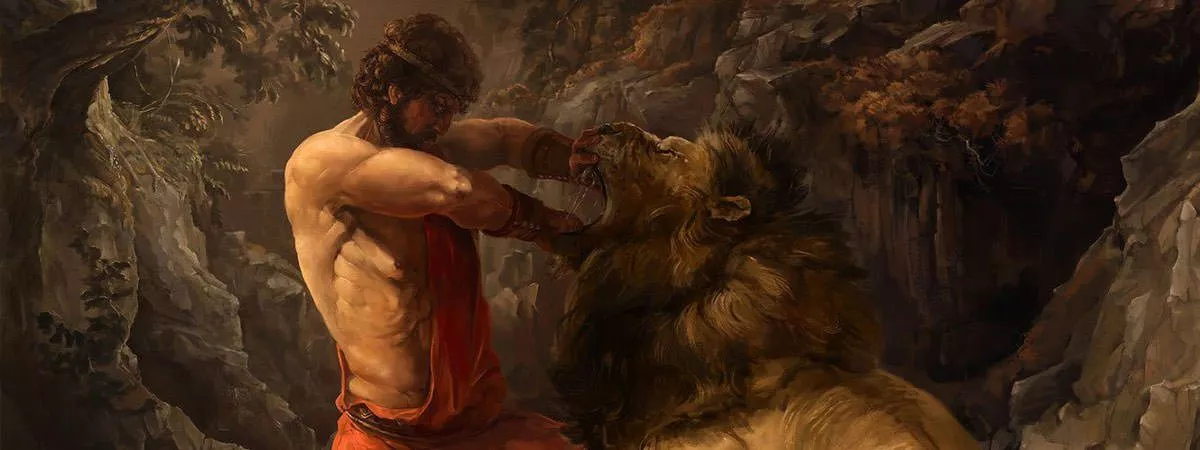The Hercules from the Roman myths is a later adaptation of the Greek divine hero Heracles. He is the most celebrated of characters in the Greco-Roman mythologies. Hercules is the son of the ‘King of Gods’ Jupiter (Zeus in the Greek myths) from a mortal woman named Alcmene. Born as a demi-god Hercules possesses incredible strength and displays extraordinary capabilities from an early age. However his life is far from being easy. Hercules faces several difficulties and challenges, while his relationships with others are often disastrous. The primary reason for this is the wrath of his stepmother and the ‘Queen of Gods’, Hera. Hercules was looked upon as the champion of the weak and as a great protector for ages. As a divine hero who suffered like mortals but performed extraordinary deeds Hercules developed great appeal for the people of Greece and Rome. There are several legendary stories regarding his heroics, strength and masculinity, with the most famous being the ‘Twelve Labours of Hercules’. Know more about the Greco-Roman hero through the 10 most famous myths featuring him.
#1 DENIED AT BIRTH
Hercules was the son of Jupiter (Zeus). His mother Alcmene was a mortal queen married to Amphitryon, son of another legendary Greek Hero Perseus. The exceptional beauty of Alcmene attracted Zeus, who was notorious for his sexual escapades, chasing one woman or the other. Alcmene refused the advances of Zeus, but he tricked her by taking the appearance of her husband Amphitryon and impregnated her with Hercules. When Alcmene went into labor, Zeus announced to the Gods that a grandson of Perseus was about to be born and would one day become the High King. The queen of gods, Hera, aware of the honors her husband bestowed on his illegitimate sons, grew angry and jealous. She thus resolved to prevent Alcmene’s child from Zeus from fulfilling his aforesaid destiny. Hercules had thus gained a powerful enemy before his birth and he would continue to invite Hera’s wrath in his lifetime.
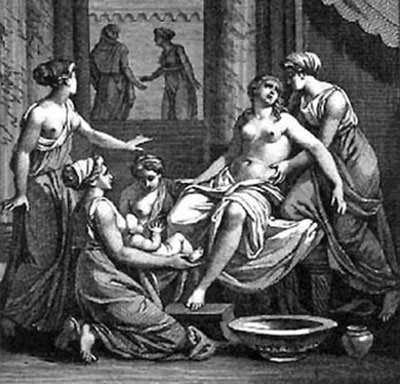
Hera rushed to Alcmene’s dwelling and forced Ilithyia (Lucina in the Greek myths), the goddess of childbirth, to delay the birth of Hercules and his twin brother Iphicles. As Ilithyia trapped the twins in the womb, Hera caused the premature birth of Eurystheus, another grandson of Perseus. This ensured that Zeus’s prophesy was now fulfilled by Eurystheus. Ilithyia would have permanently delayed the birth of the children but she was fooled by one of Alcmene’s servants Galanthis. The servant lied to the goddess that Alcmene had already delivered the baby. This distracted Ilithyia and her curse was broken, enabling the birth of Hercules. Galanthis was turned into a weasel or a cat for her insolence by the goddess.
#2 FORMATION OF THE MILKY WAY
A case of heteropaternal superfecundation, Alceme carried the children of Zeus and her husband Amphitryon, in the same womb. However when she gave birth to the twins (named Alcides and Iphicles), no one was certain which child belonged to whom. Alceme was correct in her belief that Alcides (Hercules), the larger of the two was Zeus’s son. She feared the revenge that Hera would bring upon her and decided to abandon the baby, leaving Alcides to die of exposure in a Theban feild. The abandoned Hercules was however picked up by the goddess Minerva (Athena in Greek myth), his half sister and protectress. Athena knowing fully well whom she had rescued, played mischief with Hera and handed over the child to her. Hera did not recognize Hercules and began to take care of him, ironically nursing the very child she had prevented from being born. Hercules was revitalized and gained further strength through the nourishment of Goddess Hera’s milk. One day as the child happily suckled upon the nipple of Hera, he sucked too hard. In pain, Hera removed the baby from her breast. As she did so, the motherly milk of Hera sprayed out into the heavens and created the Milky Way.
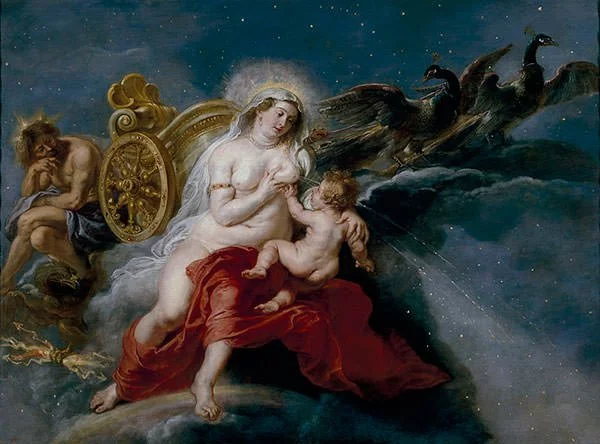
#3 HERA’S SERPENTS
In some time, Goddess Athena returned the baby Alcides (Hercules) to his mortal mother Alcmene, and his stepfather Amphitryon. The couple accepted their fate, realizing that it is the will of the Gods for them to bring up the child. The troubles for Alcides however continued as Hera had not forgotten about Alcmene’s son from her husband Zeus. As Hera was not aware which of Alcmene’s sons was the demigod, she sent 2 serpents to finish off the 8 month old twins. As the serpents climbed the crib shared by the brothers, Iphicles began to cry in fear. Alcides on the other hand, grabbed both the snakes and strangled them. A concerned Amphitryon consulted the wise Theban prophet Tiresias, who assured him that the serpents would only be the first of many monsters Alcides would kill in his lifetime. Wishing to protect their son and in the hope of mollifying Hera, Alcides was renamed as Heracles by his parents, which meant “glory of Hera”. Hercules is a later Roman adaptation of the name.
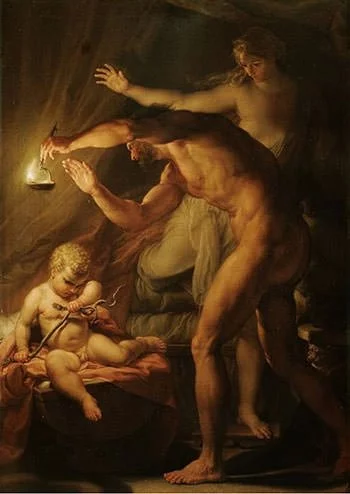
#4 HERCULES’S FIT OF MADNESS
Hercules grew up as a nobleman in the Amphitryon’s court. Once, he heard that the neighboring Theban King Creon was in trouble and his territories were taken over by the Minyans. Hercules rushed to the help of King Creon and was successful in restoring his kingdom. In gratitude the King offered his daughter Megara in marriage to Hercules. Megara and Hercules proved to be a happy couple, and had several sons together but tragedy struck when Hercules was away on an adventure. A usurper named Lycus killed Creon, took the throne of Thebes and tried to force marriage with Megara. Hercules returned in time and killed Lycus. But when he was thanking the Gods for his family’s safety, Hercules was given a fit of madness by Hera. In his mad state Hercules killed his family, mistaking his sons to be Lycus’s sons and his wife to be Hera. Devastated with his wicked deed when he came back to his senses, Hercules was engulfed in suicidal remorse.
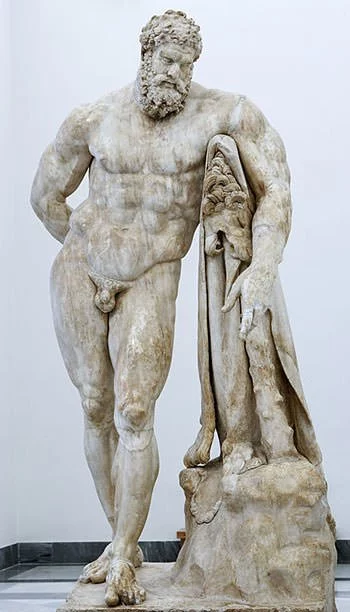
#5 HERCULES SERVES ARCH-RIVAL EURYSTHEUS
Hercules deeply regretted the sinful deed of murdering his own family. He wanted to take his own life but his cousin Theseus convinced him against any such cowardly act. Hercules thus traveled to Delphi to seek atonement for his deed. It is here that the Oracle of Delphi Pythia, advised him to go and serve his arch-rival and cousin, King Eurystheus, for 10 long years. He is asked to perform any task set for him by Eurystheus and only then could he earn redemption. A despaired Hercules, asked to serve his enemy and a man far inferior to him, finally submitted. He is unaware that both the Oracle and Eurystheus are in the service of Hera. Eurystheus had become a powerful king instead of Hercules only because of Hera and was completely loyal to the Goddess. Together they would devise 10 nearly impossible tasks for Hercules to fail and perish, these are known as the “Labors of Hercules”.
#6 LABORS OF HERCULES
As Hercules began serving King Eurystheus, he is sent to complete 10 impossible tasks. The labors are not recounted in any single place, but may have been reassembled from many sources. A traditional order of the labors found in the Bibliotheca goes as such:-
1. Slaying the Nemean Lion
A vicious lion was terrorizing the people of the city of Nemea. The monster had a magical golden hide which was impenetrable to any weapons. Upon discovering the secret, Hercules had to fight and strangle the beast with his bare hands. After slaying the animal Hercules finally succeeded to skin it with its own claws. The lion’s pelt was used by Hercules as an armor in his future adventures.
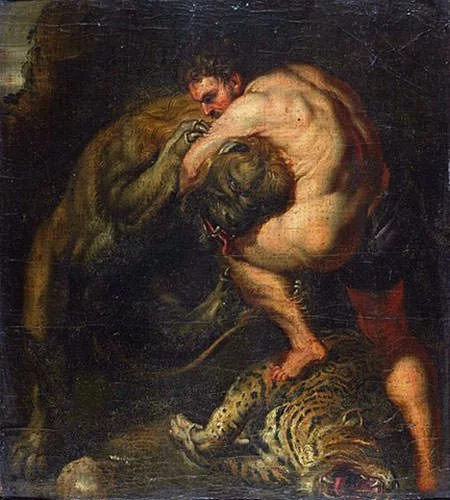
2. Slaying the Lernaean Hydra
The Lernaean Hydra was raised by Hera herself to put an end to Hercules. A water snake with its lair in the lake of Lerna, Hydra had a poisonous breath and blood so virulent that even its scent was deadly. Hydra had several heads with later myths giving her a regenerative feature, where chopping of one head would result in the growth of two. As Hercules fought Hydra, he quickly realized that she could not be defeated by chopping her heads. He thus took the help of his nephew Iolaus, who suggested to use fire to scorch the neck stumps after each decapitation. The idea worked and as Hercules cut off each head, Iolaus cauterized the open stumps, finally killing the monster. After killing Hydra, Hercules dipped his arrows in the monster’s blood. These potent arrows would serve him well throughout his numerous adventures.
3. Capturing the Ceryneian Hind
Furious with the success of Hercules and realizing that few monsters would stand up to the hero, Hera and Eurystheus sent Hercules to capture the Ceryneian Hind. The animal could outrun any arrow and was the sacred animal of Artemis, the goddess of hunt. After chasing the hind for a full year Hercules succeeded, but was confronted by Artemis and Apollo on his way back. Artemis forgave Hercules after listening to his plight and allowed him to complete his task.
4. Capturing the Erymanthian Boar
Hercules was asked to bring the giant Erymanthian boar alive to Eurystheus in Mycenae. To capture the boar, Hercules took advise from the Centaurs. He first chased the boar making it run through thick bushes and trees and finally drove the exhausted animal into deep snow. Hercules bound the animal in chains and carried it back in his left shoulder. The sight of Hercules carrying the boar on his shoulder so terrified Eurystheus that the king hid himself in a bronze vessel.
5. Cleaning the stables of King Augeas
The stables of King Augeas had not been cleaned for 30 years and were home to 1000 divine immortal life stock. Eurystheus tasked Hercules with the job of cleaning them, not only because it was considered an impossible chore but also to humiliate him. But Hercules succeeded in the labor by re-routing the rivers Alpheus and Peneus and washing out the filth in a single day. Hercules had demanded 1/10th of the life stock as payment if he would do the job in a day.
6. Defeating the Stymphalian birds
The man eating Stymphalian birds with bronze beaks and metallic feathers were sacred to Ares, the God of War. The birds had migrated to Lake Stymphalia in Arcadia and were terrorizing the populace. Hercules could not go too far into the swamp where the birds resided, for it would not support his weight. Athena once again came to his rescue, she gave him a rattle made by Hephaestus, the God of blacksmiths. Hercules shook the rattle and scared the birds into the air. He shot several of them with his arrows and the rest flew away never to return.
7. Capturing the Cretan Bull
Hercules sailed to Crete and after taking permission from King Minos captured the Cretan bull, father of the Minotaur.
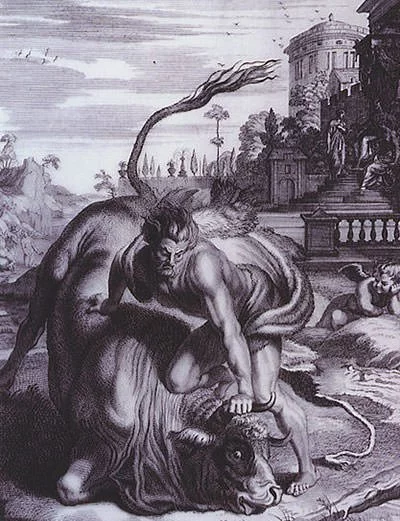
8. Stealing the Mares of Diomedes
Diomedes was the son of Ares (God of war) and Cyrene. He lived on the shores on the Black Sea and ruled over a tribe in Thrace. His horses were fed an unnatural diet that included the flesh of unassuming guests and visitors to the island. This drove them to madness and they were difficult to tame. Hercules tried to pacify the horses and after realizing that it was human flesh that calmed them, he fed their owner Diomedes to them and succeeded in taking them to Eurystheus.
9. Stealing the belt of Hippolyta
Hippolyta, the queen of the Amazons, wore a belt which was a gift from her father Ares. Eurystheus’s daughter Admete fancied the adornment and Hercules was tasked with bringing the belt. The task seemed simple enough as Hippolyta was impressed with the brave and famous Hercules, agreeing to amicably part with the belt. But Hera disguised as an Amazon woman spread a rumor that Hercules was out to abduct Hippolyta. This led to the Amazons attacking Hercules. The confusion and distrust led Hercules to kill the queen and steal her belt.
10. Stealing the cattle of Greyon
Greyon was a three bodied giant that lived in the island of Erytheia in the far west. Hercules was tasked with stealing his cattle as his 10th labor. When he finally arrived on the island, he was confronted by the two-headed dog Orthrus. Hercules dealt with the animal in one blow and a similar fate was bestowed upon the herdsman Eurytion. The commotion finally alerted Greyon. The giant carrying three shields and three spears, and wearing three helmets attacked Hercules at the River Anthemus. He was however slain with ease by one of Hercules’s poisoned arrows. As Hercules herded the cattle back to Eurystheus, Hera played her tricks yet again sending gadfly to bite the cattle and scatter them. It took almost a year for Hercules to retrieve them. Then Hera sent a flood so that Hercules could not cross the river with the cattle, but Hercules piled stones into the river and completed the 10th labor.
#7 TRICKED INTO 2 MORE LABORS
After the completion of the 10th labor, Hercules’s obligation to Eurystheus had ended. However instead of freeing him, the King declared that two of his labors did not count. Hercules was reminded that while killing Hydra he had taken the assistance of his nephew Iolaus. Also that he had taken payment for cleaning of the Augean stables and it was the rivers that had done the work for him. Hercules was thus tricked into performing two additional labors for Eurystheus.
11. Stealing the Golden Apples
Hercules was tasked with stealing 3 golden apples from the garden of Hesperides, the nymphs of the evening. The task was difficult as the garden belonged to Hera and was guarded by the nymphs and a dragon named Ladon. On his way to the garden Hercules encountered the Titan Atlas, holding the heavens on his shoulders. Hercules persuaded Atlas to get the apples for him in return for holding his weight and relieving him from his curse for some time. Atlas was the father of the nymphs and it was easier for him to access the garden. However when Atlas returned with the apples, he offered to deliver them himself and was in no mood to take the heavens back. Realizing what he had gotten himself into, Hercules tricked Atlas to hold back the weight and ran off with the apples.
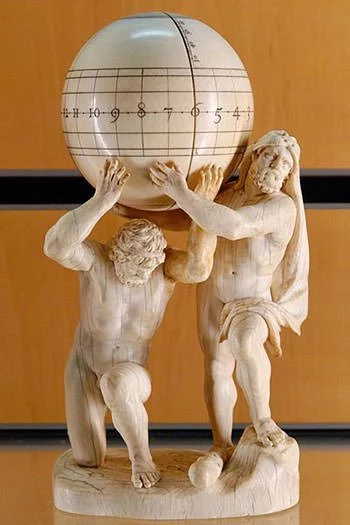
12. Capture of Cerberus
Cerberus was the three headed dog that guarded the gates of the underworld. Hercules’s twelfth and final labor was to capture the dog. Hercules prepared for his descent to the underworld by being initiated in the Eleusinian Mysteries. With Athena’s help he found an entrance to the underworld and eventually found Hades, king of the underworld. Instead of attempting to steal the monstrous dog, Hercules chose to ask Hades for permission to borrow it. Hades agreed on the condition that the hero should be able to capture and subdue the dog without the use of weapons and without injuring it. Hercules overpowered Cerberus with his bare hands and slung the beast over his back. He then carried it out and back to Eurystheus. Eurystheus was again terrified of the monster and begged Heracles to return Cerberus to the Underworld, offering in return to release him from any further labors. Cerberus was hence released and found his way back to his post on the gates of the Underworld.
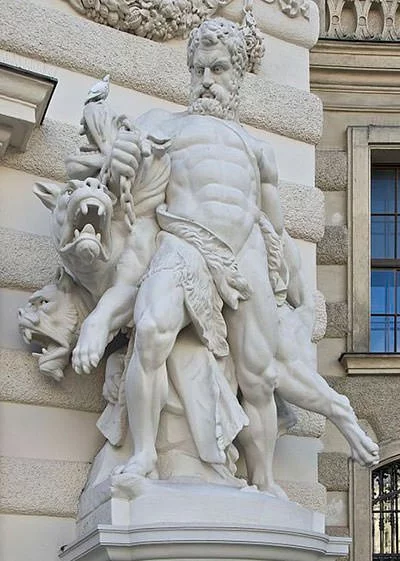
#8 HERCULES AND OMPHALE
Now free from slavery, Hercules was free to do his will. But due to Hera’s tricks and his own lack of restraint, Hercules’s life would never be peaceful. Hercules murdered his friend Iphitus in another fit of rage. Repenting his deed, he traveled once again to Delphi for a way to purify himself. When the Oracle remained silent to his queries, Hercules got furious and tried to steal the tripod of Delphi. The Oracle of Delphi finally declared that Hercules be sold into slavery for a year for his horrible deeds. This resulted in Queen Omphale buying the Hero from Hermes. Omphale was the queen of Lydia, an ancient kingdom around modern day Turkey. The myth took an unexpected turn when during his enslavement Hercules and Omphale inverted their gender roles. Hercules was to do what was traditionally women’s work and wear women’s clothing while Omphale wore Hercules’s Nemean lion skin and headdress. She also carried his club. Omphale finally freed Hercules and impressed by the Hero, married him. The couple had a son together. The myth remained quite popular among artists giving them license to explore erotic themes and gender roles further.
#9 HERCULES AND DEIANIRA
Hercules continued his adventures helping the Gods of Olympus fight against the Titans. In the fight he rescued the world from chaos and the Gods from imprisonment. Further down in his lifetime, Hercules landed in Claydon and fell in love with princess Deianira. To win her hand in marriage, Hercules defeated the river God Achelous in a wrestling challenge. Hercules and Deianira had a happy marriage but the relationship would ultimately lead to Hercules’s death. Once, while the couple were attempting to cross a dangerous river, a centaur named Nessus offered to help the woman cross. Upon reaching the other side, Nessus showed his true intention and tried to rape Deianira. This forced Hercules to kill him, with an arrow dipped in Hydra’s poison.
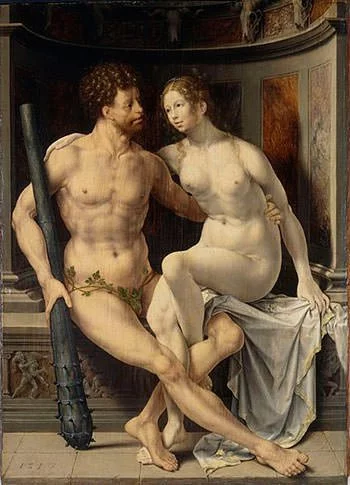
However in his dying moments the centaur planned his revenge on Hercules. He told Deianira that his blood was a love potion and, by rubbing just a bit of it onto Hercules’s clothes, she could ensure that the hero would always remain faithful. Struck by Hydra’s poisonous arrow, Nessus understood fully well that his blood would be deadly to any mortal. Hercules and Deianira settled in the city of Trachis and started a family. Deianara held on to the potion for many years but eventually she felt threatened by Iole, another princess. Fearing that Hercules would abandon her, she offered the tunic soaked in Nessus’s blood to her husband. The poison quickly ate into Hercules and the incredible pain maddened him. His last act as a human was to build his own funeral pyre at mount Etna and throw himself in it, to finally end his suffering and his mortal life. Knowing what she had unwittingly done, Deianira killed herself.
#10 THE MORTAL WHO BECAME GOD
Hercules story did not end with his mortal death. As he burnt in his pyre his mortal side was consumed but his immortal side remained. Athena herself carried him to Olympus in her chariot where he was welcomed as a God and gained immortality. Hera too ended her long enmity with her stepson once he was given a divine status. His last marriage was to his half-sister Hebe, the daughter of Zeus and Hera. She was the goddess of youth and served as her father’s cup bearer. The pair lived peacefully in their father’s household as a picture of marital fidelity and happiness.

